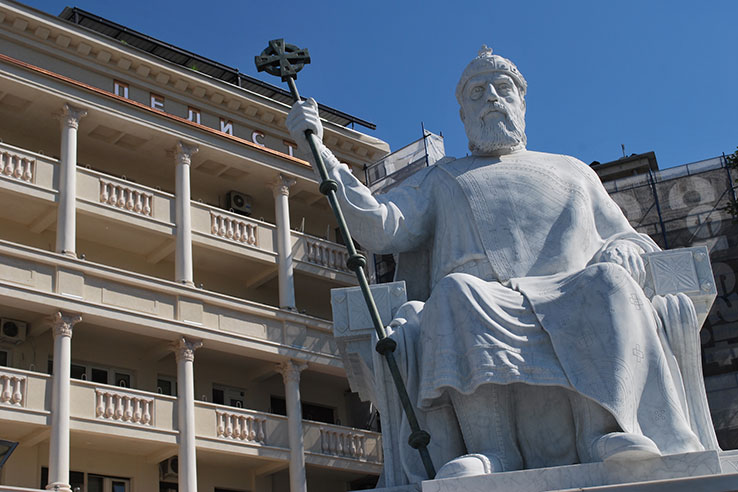Ognen Vangelov and Ljupcho Risteski
 Nowhere in the world have Commissions such as this existed to establish "historical truths", especially not "truths" about the medieval history, because that would turn them into censorship bodies.
Nowhere in the world have Commissions such as this existed to establish "historical truths", especially not "truths" about the medieval history, because that would turn them into censorship bodies.
In the text „On uniting around our common history - Tsar Samoil erga omnes“ published by ResPublika on 7 April 2021, the Bulgarian member of the Joint Multidisciplinary Expert Commission for Historical and Educational Issues between the Republic of North Macedonia and the Republic of Bulgaria, Mr. Kajchev, provides public statements that imply that the Macedonian members of the Commission refuse to confront the sources about the medieval kingdom of Tsar Samoil and that they are hostages to some unscientific theses about the nature of that kingdom.
In doing so, Mr. Kajchev refers to the literature list submitted by his Bulgarian colleague, Mr. Metodiev, at the most recent meeting of the Joint Commission in February 2021. Before Mr. Kajchev started a discussion on the said literature, he is first putting forward the thesis that in the last few months the talks of the Joint Expert Commission "made no progress" and makes no "objective unification around our common history" – this is the attitude with which the Macedonian side does not agree at all.
Firstly, these standpoints of the Bulgarian side in the Commission have been there since the beginning of its work. The Joint Commission has long and expert discussions on open issues which, due to the almost diametrically different positions in understanding the role of this Commission, as well as due to different approaches in the analysis of textbooks, but mostly due to differences in making proposals for possible improvement of the content in the textbooks, the Commission finds it difficult to come up with substantive and mutually agreed proposals. These proposals mainly address issues such as the ethnic or "ethnic-bearing" character of the medieval states, the understanding of ethnic processes in the middle ages, and, above all, the understanding and interpretation of the term "common history". The colleagues from the Bulgarian side of the Commission, unfortunately, interpret this term entirely unilaterally, as a history of Bulgaria and the Bulgarians, almost entirely omitting the facts of the historical development of the Macedonian ethnic, cultural and national distinctiveness and self-awareness.
Ten centuries of ethnic homogenization?
Before we go back to the standpoint raised by Mr. Kajchev that "there is no special dilemma in the research on what was the country that was ruled by Samoil" and that has been already clarified since long time ago", we will refer to the quote he gives in the conclusion of his text, namely that "the dispute over whether Samoil created the Macedonian, West Bulgarian or the Bulgarian state is unhistorical because it projects the modern ethnic differences into the past." Furthermore, Mr. Kajchev says that "no one claims that the Bulgarian statehood, culture and identity from the time of Tsar Samuel are equal to the one today."
As a rule, Mr. Kajchev uses the substitution of theses in order to leave a public impression that this is an irrational dispute and disagreement between the two sides due to the alleged fact that the Macedonian part of the Commission insists on non-historical projection of the contemporary ethnic differences to the past. What is crucial in the insistence of Mr. Kajchev is completely absent in his text. The reality is exactly the opposite – Mr. Kajchev seems to be primarily interested in what the "correct" interpretation of the sources and their presentation in the Macedonian textbooks should be.
Mr. Kajchev calls for a "correct interpretation" of those sources in the context of "our common history" from the middle ages period to the present day. Therefore, according to the "correct interpretation" of the Bulgarian colleagues, from the ninth to the eleventh century, that is, before and during the reign of Tsar Samoil, there was a "permanent ethnic homogenization of the Slavic and Proto-Bulgarian population" in the present-day Bulgaria and Macedonia (this refers to the wider geographical region that also includes a territory that is today in Greece). This "permanent ethnic homogenization" from ten centuries ago shows the tone of their attitude and understanding of the entire "common history" from that period until today on these territories. This key thesis that the Bulgarian members of the Commission impose in the discussions is omitted from the statements given by Mr. Kajchev to the Macedonian public. It is omitted, because in that case, the above statement that the projection of modern ethnic differences in the past is unhistorical will be in direct contradiction with what Mr. Kajchev is advocating for and that quote would be completely out of place in such a context.
To make it clearer to the public, under "permanent ethnic homogenization", the Bulgarian side of the Commission means consolidation of a single Bulgarian ethnocultural identity on the territory of Bulgaria and Macedonia ten centuries ago. According to them, that ethnocultural identity has been determining the later history in this region ever since. Therefore, in their view, the historical "truth" is unambiguous, and the Macedonian identity today is a result of the interventionist processes that were there only to separate the single ethno-cultural identity that was consolidated since ten centuries ago and which existed as such until 1944. When Mr. Kajchev would write this, without hiding behind the "sources", then it will be much clearer what he actually insists on.
 Source: calvertjournal.com
Source: calvertjournal.com
If Mr. Kajchev did not omit that key "detail" in his text, it would have become quite clear to the readers that the "correct interpretation" of the sources, which are unambiguous, as he says, must include a context of a common primordial Bulgarian ethnic identity in both Bulgaria and Macedonia which was formed and consolidated during the medieval kingdoms in this region. Of course, if that key detail is present in the statement of Mr. Kajchev, he will have much more difficulty to claim that the world science is unambiguous about the character of the medieval kingdoms in this region. It is like that because none of the bibliographic units included in the list of Mr. Metodiev does not have such categorical claims, nor do those sources deal with such issues. Exactly the fact that those sources do NOT deal with issues of "permanent ethnic homogenization" of a single Bulgarian nation in the territory of today's Bulgaria and Macedonia is the core of the disagreement between the Macedonian and Bulgarian members of the Commission. Hence, the claim that the Macedonian part of the Commission insists on some non-historical interpretation of the issues related to the middle ages presented in the textbooks becomes meaningless. It seems that exactly the opposite is happening.
What is the role of Commissions of this type?
Given that the interpretation of what was the nature of those kingdoms can be different, the Macedonian members insist on respect of the internationally accepted principles and recommendations for preparation of textbooks developed by UNECO, Council of Europe in the process of improving the content of the textbooks, and also defined by institutions that work on analyses and improvement of the textbooks, such as, for example, the Georg Eckert Institute from Germany. The Macedonian side proposes first to change the paradigm in the textbooks and instead of sticking to the "consensual canon" in historiography, to offer multiperspectivity to students, which in this case would mean inclusion of all significant theoretical views of the historiography worldwide.
Contrary to the "authoritarian" and "rigid" learning process based only on "sources and facts" that does not comply with the didactic principles, the Macedonian side in the Commission insists on a "discursive analysis" which, starting from the "facts or sources", will reach the appropriate "interpretation or interpretations of the facts", which will help students develop their skills for argumentation and evaluation, not just producing knowledge and data and repetition thereof (UNESCO Guidebook, 2010:50). The fact that the Western science does not deal in details with the middle ages in terms of “proving" "permanent and homogenized" Bulgarian ethnocultural identity in this region and the "common history" of Macedonians and Bulgarians, is more than enough for our methodological position to remain strong and unwavering.
We were pleased to review the 21 bibliographic units that my colleague Metodiev had sent to the Macedonian side. Indeed, they were the basis for our discussion at the last session. What should be mentioned here is that almost each of these modern publications list the most important question about Samoil and his state – and that is the lack of sources from the time of his life and existence of his state (there is no single preserved document from the Tsar’s office, which is the usual institution and practice of a medieval ruler), as well as the fact that another part of the sources that are written by contemporaries of his state or authors who had no direct contact with that state.
Other sources are mostly written a century later and have an interpretive and discursive character. The situation with the sources is such that it does not allow for final and firm conclusions. Mr. Ostrogorski, one of the greatest scholars and experts in Byzantium studies, says of the komitopul: "Nothing is certain about the early history of the komitopuli (Ostrogorski, History of Byzantine Empire 2011, 377). We want to make the future generations of students aware of these facts – not to offer them ready-made theses, which are controversial to a greater or lesser extent.
Second, and just as important, is that in almost each of these publications the opportunity for scientific discussion is opened, while especially avoiding the possible projection of contemporary views and attitudes on historical events of the past. Almost each of these publications calls for "critical-oriented medievalism" and the relativization of (the national) histories full of popular imagination. These are the theoretical concepts on which the Macedonian side wants to build the recommendations for improving the textbooks in both Macedonia and Bulgaria, and not to replace the old "historical dogmas" with "new-old historical dogmas".
Issuing decrees on "historical truths" or multiperspectivity?
Now, let’s go back to the claim that „there is no dilemma in the research on what was the state ruled by Samoil" and that "has been already clear for a long time." It is important to emphasize that we, as Macedonian members, do not abstract at all the views expressed in a number of studies on this topic. However, here we need to return to the quote that Mr. Kajchev singles out, and which is expressed in the first statements of classic references to the state of Samoil, in the text entitled "Samoil of Bulgaria", where the author Alexander Kazhdan in the Oxford Dictionary writes the following: "The controversy over whether Samoil created a Macedonian, Western Bulgarian or Bulgarian state is unhistorical, as it produces the ethnic differences in the past."
The author Antony Kaldelis in discusses in the book "The Land of the Romei, Ethnicity and the Empire in Byzantium” the character of empires, including Byzantium, and says in the introduction: “Let us begin with the term empire. In ordinary language, as in many scientific fields, "empire" refers to the dominance exercised by one ethnic, ethno-religious, or ethno-political group over a number of others which are considered different from the ruling group. The empire is not constituted by ordinary power relations within a group, but it refers to a political hierarchy and socio-economic inequality. It focuses specifically on how ethnic differences are reproduced, constituted or carried out at the level of governance, discourse and the economy." (Pp. IX-X) (...) noting that "In other words, empires are by definition multiethnic, with a broad view of ethnicity. Byzantium is also often referred to as multiethnic, largely on the grounds that it is an empire." (p. X)
Hence, without entering into a deeper discussion about Samoil and his state, we want to emphasize that, as Macedonian members of the Joint Commission, we will continue to adhere, as we did in the past, to the analysis of textbooks and creation of recommendations for their improvement in both countries, and we will respect the international principles of UNESCO and the CoE, based on two aspects: didactic analysis and content analysis.
Nowhere in the world have these Commissions existed to establish "historical truths", especially not "truths" regarding medieval history, because that would turn them into censorship bodies. The proposals backed up by the Macedonian members of the Commission, are an open, multi-perspective, critical view of the concept of self and others.
In this regard, we encourage a critical attitude towards the existing concepts of various collective identities that are often "stuck" in history and related to certain territories "owned" by the communities. We advocate an approach in which the ideas of modern nation states are not mirrored in the past. Theories of autochthony in order to legitimize cultural domination, uniqueness and exclusivity are left in the past and we want the conflicting national myths that include these essentialist concepts to be replaced by multiperspective methodologies and skills-oriented approaches.
In addition to the so-called "master narratives" we want to leave enough space for other, less visible narratives. Unfortunately, the approach of the other side makes our attempts less and less possible, or almost completely impossible.
Please refer to the Terms before commenting and republishing the content.
Note: The views and opinions expressed in this article are those of the author and do not necessarily reflect the views of the Institute of Communication Studies or the donor.


